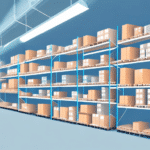The Benefits of Using a Fulfillment House for Ecommerce
As ecommerce businesses grow, so do the challenges of managing inventory, packing and shipping orders, and meeting customer expectations. To address these challenges, many businesses turn to a fulfillment house to manage their operations more efficiently. In this article, we will explore the benefits of using a fulfillment house for ecommerce.
Understanding the Role of a Fulfillment House in Ecommerce
A fulfillment house is a third-party service provider that handles the order fulfillment process for ecommerce businesses. Their primary roles include receiving inventory, warehousing, picking and packing orders, and shipping them to customers. Some fulfillment houses also offer additional services such as returns processing, kitting, and customization.
Using a fulfillment house can streamline operations, allowing businesses to focus on other aspects like marketing and product development. By outsourcing order fulfillment, businesses can save time and money on warehousing and shipping costs, as well as reduce the risk of errors and delays. Additionally, many fulfillment houses offer advanced technology and reporting capabilities that help businesses track inventory levels, monitor order status, and analyze customer data to improve overall ecommerce strategy.
According to a Forbes report, leveraging fulfillment services can increase order accuracy by up to 99%, enhancing customer satisfaction.
How a Fulfillment House Can Help You Scale Your Business
A fulfillment house can help you scale your business by managing your order fulfillment process efficiently. As your orders increase, a fulfillment house can help you avoid the costs of hiring and training new staff, renting additional warehouse space, and purchasing more equipment. They can also help you reach new markets by reducing shipping costs and transit times, making your products more attractive to customers located further away.
In addition to these benefits, a fulfillment house can provide valuable data and insights into your order fulfillment process. By tracking inventory levels, order volumes, and shipping times, they can help you identify areas for improvement and optimize your operations for greater efficiency and cost savings.
Furthermore, a fulfillment house can offer value-added services such as kitting and assembly, custom packaging, and returns management. These services enhance customer experience and differentiate your brand from competitors, ultimately leading to increased customer loyalty and repeat business.
According to the Statista 2023 report, global ecommerce sales reached $5.7 trillion in 2023, emphasizing the importance of efficient fulfillment strategies to handle increased demand.
Cost Savings: How Using a Fulfillment House Can Reduce Your Expenses
Using a fulfillment house can help you save costs in several areas. For example, you can avoid the expenses of renting or buying warehouse space, and investing in equipment such as shelving, pallets, and conveyors. Additionally, by outsourcing fulfillment, you can reduce the costs of hiring and training staff, along with their benefits and insurance expenses. A reputable fulfillment house will have established relationships with shipping carriers, which can lead to lower shipping and handling costs.
Another way that using a fulfillment house can reduce your expenses is through inventory management. A good fulfillment house will have advanced inventory management systems that help you optimize your inventory levels, reducing costs associated with overstocking or understocking. With real-time visibility into inventory levels, you can make informed decisions about when to reorder products and how much to order, helping you avoid costly stockouts or excess inventory. Additionally, a fulfillment house can help you reduce the costs of returns processing by providing efficient and streamlined returns management services.
Research by Business News Daily indicates that businesses can reduce fulfillment costs by up to 30% by partnering with a fulfillment house.
Improved Order Accuracy: The Advantages of Outsourcing Fulfillment
Fulfillment houses have standardized, automated processes for receiving inventory, picking and packing orders, and shipping them to customers. By outsourcing these processes, businesses can ensure higher accuracy and minimize the risk of errors and exceptions. Additionally, many fulfillment houses use advanced technology such as barcode scanning and inventory management systems to track inventory movement, enabling them to deliver the right products to customers at the right time.
Another advantage of outsourcing fulfillment is that it allows businesses to focus on their core competencies. By delegating logistics and supply chain management to a third-party provider, businesses can concentrate on product development, marketing, and customer service. This can lead to increased efficiency and productivity, as well as improved customer satisfaction.
Outsourcing fulfillment also provides cost savings. Fulfillment houses leverage economies of scale to negotiate better rates with carriers and suppliers, and can spread fixed costs across multiple clients. This results in lower shipping and handling costs, as well as reduced overhead expenses for warehousing and staffing.
As Entrepreneur highlights, automated fulfillment processes can boost order accuracy by reducing human errors and ensuring timely deliveries.
Faster Shipping and Delivery Times with a Fulfillment House
Fulfillment houses have established relationships with shipping carriers and can negotiate better rates and shipping times. By partnering with a fulfillment house, ecommerce businesses can ensure faster transit times, leading to improved customer satisfaction and loyalty. Additionally, fulfillment houses are typically strategically located in areas with good transportation infrastructure, which further reduces shipping times and costs.
Another benefit of using a fulfillment house is that they handle the entire shipping process, from packaging to delivery. This allows ecommerce businesses to focus on other aspects of their operations, such as marketing and product development, while the fulfillment house takes care of logistics. Fulfillment houses also have advanced technology and software to track shipments in real-time, providing businesses with greater visibility and control over their inventory and orders.
According to the Inbound Logistics, 70% of customers consider fast shipping as a key factor in their purchasing decisions.
Increased Customer Satisfaction: How a Fulfillment House Can Help You Meet Expectations
With ecommerce businesses, customer expectations for shipping times and delivery accuracy are increasing. By outsourcing fulfillment to a professional service provider, businesses can improve the consistency and quality of their delivery, leading to higher customer satisfaction ratings. Additionally, a fulfillment house can assist with customer service inquiries and returns, freeing up internal resources and enabling businesses to focus on other critical growth areas.
Another benefit of using a fulfillment house is the ability to offer customers more shipping options. Fulfillment houses enable businesses to offer expedited shipping, international shipping, and even same-day delivery in some cases. This helps attract and retain customers who value fast and flexible shipping options.
Furthermore, a fulfillment house can provide businesses with valuable data and insights into their shipping and delivery processes. By analyzing this data, businesses can identify areas for improvement and make data-driven decisions to optimize their fulfillment operations, leading to greater efficiencies and cost savings over time.
According to Harvard Business Review, faster and reliable shipping significantly enhances customer loyalty and repeat business.
Enhanced Inventory Management: The Benefits of Using a Fulfillment House
Fulfillment houses help businesses manage their inventory more effectively by providing real-time visibility into inventory levels and movements. Businesses can also take advantage of economies of scale by pooling inventory resources with other businesses and implementing a more robust demand planning process. Inventory optimization results in lower holding costs and better management of aging stock items.
In addition to inventory management benefits, using a fulfillment house can improve order accuracy and speed. Fulfillment houses have advanced technology and processes to ensure that orders are fulfilled accurately and quickly, leading to increased customer satisfaction and repeat business.
Another advantage of using a fulfillment house is the ability to expand into new markets without the need for additional infrastructure. Fulfillment houses provide warehousing, shipping, and other logistics services in new markets, allowing businesses to focus on sales and marketing efforts. This is especially beneficial for small businesses looking to expand their reach without incurring significant overhead costs.
Research by McKinsey shows that optimized inventory management can reduce inventory costs by up to 20%.
Focus on Core Business Activities: Why Outsourcing Fulfillment Makes Sense
By outsourcing order fulfillment activities, ecommerce businesses can free up valuable time, resources, and personnel to focus on core business activities such as marketing, product development, and customer service. Delegating routine order fulfillment tasks to a dedicated team allows businesses to deliver greater value to their customers and grow their business. Additionally, outsourcing to a fulfillment house mitigates the risk of errors and exceptions in the order process, reducing the need for businesses to intervene and divert attention toward fulfilling orders.
Moreover, outsourcing fulfillment provides businesses access to advanced technology and expertise that they may not have in-house. Fulfillment houses often have state-of-the-art software and equipment that streamline the order fulfillment process, resulting in faster and more accurate deliveries. They also employ experienced personnel trained in handling various aspects of order fulfillment, such as inventory management, shipping, and returns processing. By leveraging the technology and expertise of a fulfillment house, businesses can improve overall efficiency and customer satisfaction.
As noted by Inc.com, outsourcing fulfillment allows businesses to scale more efficiently without the need for significant capital investment.
Flexibility and Scalability: How a Fulfillment House Can Adapt to Your Needs
A good fulfillment house adapts to your business's unique requirements. For example, as your business grows or seasonal demand cycles change, a fulfillment house offers solutions to manage spikes and dips in demand. They provide the flexibility to accommodate business-specific requirements and offer customized solutions that best fit your needs.
- Scalable storage solutions to accommodate growth
- Flexible staffing to handle seasonal peaks
- Customizable packaging and shipping options
Partnering with the Right Fulfillment House for Your Business
When choosing a fulfillment house, it's essential to select a partner that offers a range of services that best fit your business needs. Companies should evaluate a fulfillment house based on its experience with other ecommerce businesses, infrastructure and technology capabilities, location, cost structure, scalability, and flexibility. The fulfillment industry is highly competitive, so businesses should seek quotes from multiple providers and carefully compare their offerings before making a decision.
Consider the following when selecting a fulfillment house:
- Integration capabilities with your ecommerce platform
- Customer service and support
- Reputation and reviews from other clients
- Pricing transparency and fee structure
Additionally, check if the fulfillment house complies with industry standards and data security measures to protect your business and customer information.
The Future of Ecommerce and the Role of Fulfillment Houses
The ecommerce industry is growing rapidly, and so is the role of fulfillment houses. In the future, as ecommerce businesses continue to scale and customer demand increases, the need for efficient, reliable order fulfillment will become even more critical. Fulfillment houses will play a crucial role in helping ecommerce businesses meet customer expectations and provide a competitive advantage by offering advanced, value-added services such as customization, kitting, and flexible shipping options.
Emerging trends like same-day delivery, sustainable packaging, and automated warehousing will further enhance the capabilities of fulfillment houses, making them indispensable partners for ecommerce growth.
Best Practices for Working with a Fulfillment House in Ecommerce
To ensure a successful and productive relationship with a fulfillment house, establish clear communication channels and set expectations from the outset. Regular communication and feedback with the fulfillment house are crucial to avoid surprises or missed expectations. Additionally, consider designating team members dedicated to working with the fulfillment house to ensure continuity of service and process alignment.
Best practices include:
- Clearly defining your requirements and expectations
- Establishing key performance indicators (KPIs) to track performance
- Regularly reviewing and assessing fulfillment performance
- Maintaining open lines of communication for issue resolution
Measuring Success: Key Performance Indicators for Ecommerce Fulfillment Houses
Businesses should track key performance indicators (KPIs) to measure the success of their partnership with a fulfillment house. Examples of KPIs include:
- Order fulfillment accuracy
- Delivery times and on-time delivery rates
- Inventory turnover rates
- Employee productivity and labor costs
- Customer satisfaction ratings
Regularly tracking these KPIs ensures the partnership is delivering the expected positive impact and helps identify areas for improvement.
Conclusion
Using a fulfillment house for ecommerce offers numerous benefits, such as cost savings, increased scalability, enhanced inventory management, faster shipping times, and improved customer satisfaction. By outsourcing fulfillment, businesses can focus on their core competencies and delegate routine tasks to professional service providers. As ecommerce continues to grow, partnering with the right fulfillment house is critical to meeting customer expectations and building a competitive advantage.






















